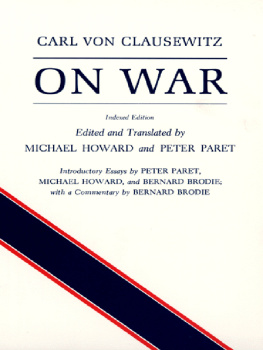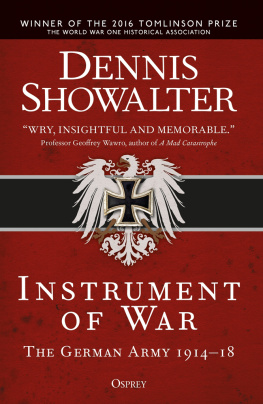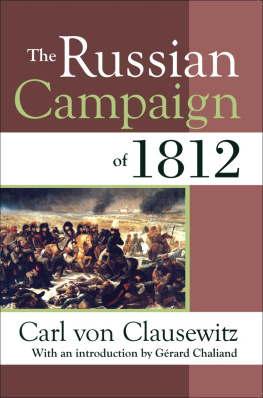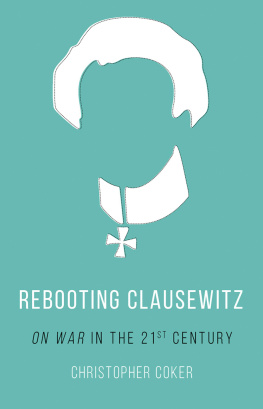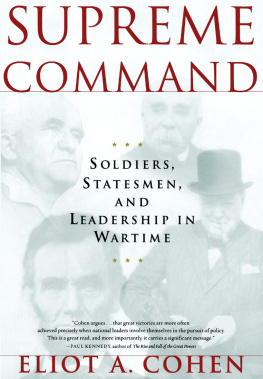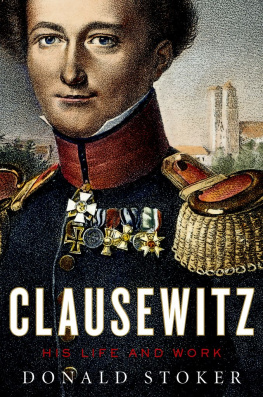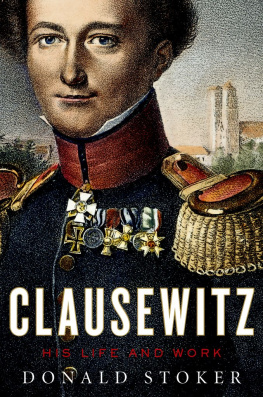Clausewitz - On War
Here you can read online Clausewitz - On War full text of the book (entire story) in english for free. Download pdf and epub, get meaning, cover and reviews about this ebook. publisher: Princeton University Press, genre: Science. Description of the work, (preface) as well as reviews are available. Best literature library LitArk.com created for fans of good reading and offers a wide selection of genres:
Romance novel
Science fiction
Adventure
Detective
Science
History
Home and family
Prose
Art
Politics
Computer
Non-fiction
Religion
Business
Children
Humor
Choose a favorite category and find really read worthwhile books. Enjoy immersion in the world of imagination, feel the emotions of the characters or learn something new for yourself, make an fascinating discovery.
- Book:On War
- Author:
- Publisher:Princeton University Press
- Genre:
- Rating:5 / 5
- Favourites:Add to favourites
- Your mark:
- 100
- 1
- 2
- 3
- 4
- 5
On War: summary, description and annotation
We offer to read an annotation, description, summary or preface (depends on what the author of the book "On War" wrote himself). If you haven't found the necessary information about the book — write in the comments, we will try to find it.
On War is the most significant attempt in Western history to understand war, both in its internal dynamics and as an instrument of policy. Since the works first appearance in 1832, it has been read throughout the world, and has stimulated generations of soldiers, statesmen, and intellectuals.
On War — read online for free the complete book (whole text) full work
Below is the text of the book, divided by pages. System saving the place of the last page read, allows you to conveniently read the book "On War" online for free, without having to search again every time where you left off. Put a bookmark, and you can go to the page where you finished reading at any time.
Font size:
Interval:
Bookmark:

PREPARED UNDER THE AUSPICES OF
THE CENTER OF INTERNATIONAL STUDIES
PRINCETON UNIVERSITY
A LIST OF OTHER CENTER PUBLICATIONS
APPEARS AT THE BACK OF THE BOOK
CARL VON CLAUSEWITZ
ON WAR
Edited and Translated by
MICHAEL HOWARD and PETER PARET
Introductory Essays by PETER PARET,
MICHAEL HOWARD , and BERNARD BRODIE;
with a Commentary by BERNARD BRODIE
Index by ROSALIE WEST
PRINCETON UNIVERSITY PRESS
PRINCETON, NEW JERSEY
Published by Princeton University Press, 41 William Street,
Princeton, New Jersey 08540
In the United Kingdom: Princeton University Press, Chichester, West Sussex
Copyright 1976 by Princeton University Press
Index copyright 1984 by Princeton University Press
All Rights Reserved
Library of Congress Cataloging-in-Publication Data
Clausewitz, Carl von, 17801831.
On war.
Translation of: Vom Kriege.
Includes bibliographical references and index.
1. Military art and science. 2. War. I. Howard, Michael Eliot, 1922
II. Paret, Peter. III. Title.
U102.C65 1984 355 84-3401
ISBN 0-691-05657-9
ISBN 0-691-01854-5 (pbk.)
First Princeton Paperback printing, 1989
Princeton University Press books are printed on acid-free paper
and meet the guidelines for permanence and durability of
the Committee on Production Guidelines for Book
Longevity of the Council on Library Resources
http://pup.princeton.edu
Printed in the United States of America
15 14 13 12 11 10
15 14 13 pbk.
ISBN-13: 978-0-691-01854-6 (pbk.)
ISBN-10: 0-691-01854-5 (pbk.)
EDITORS' NOTE
The reader may wonder why another English translation of Vom Kriege is needed when two already exist. The first, made by Colonel J. J. Graham in 1874, was republished in London in 1909. The second, by Professor O. J. Matthijs Jolles, appeared in New York in 1943. But Graham's translation, apart from its dated style, contains a large number of inaccuracies and obscurities; and while Jolles' translation is more precise, both his version and Graham's were based on German texts that contained significant alterations from the first edition published in 1832.
The growing interest in Clausewitz's theoretical, political and historical writings in recent years suggested that the time had come for an entirely new translation. We have based our work on the first edition of 1832, supplemented by the annotated German text published by Professor Werner Hahlweg in 1952, except where obscurities in the original editionwhich Clausewitz himself never reviewedmade it seem advisable to accept later emendations.
In all but one respect we have followed the original arrangement of the text. The first edition printed four notes by Clausewitz on his theories, dating from various periods between 1816 and 1830, as introductions to On War itselfa practice adopted by most subsequent German and foreign editions. We have abandoned the haphazard arrangement in which these have always appeared, and instead print them in the order in which we believe the notes to have been written. Read consecutively they help to indicate how On War took shape in Clausewitz's mind, and suggest how it might have further developed had he lived to complete it. We have also included Marie von Clausewitz's Preface to the first edition of Clausewitz's posthumous works, which adds information on the genesis of On War, and on the manner in which the manuscript was prepared for publication. A brief note she inserted at the beginning of the third volume of Clausewitz's Works, immediately preceding Book Seven of On War, has been deleted since its primary concern is not with On War but with other historical and theoretical writings.
We have attempted to present Clausewitz's ideas as accurately as possible, while remaining as close to his style and vocabulary as modern English usage would permit. But we have not hesitated to translate the same term in different ways if the context seemed to demand it. For instance, we have translated Moral and moralische Kraft variously as morale, moral, and psychological. Clausewitz himself was far from consistent in his terminology, as might be expected of a writer who was less concerned with establishing a formal system or doctrine than with achieving understanding and clarity of expression. At times he writes Geisteskrfte, Seelenkrfte, even Psychologie instead of moralische Kraft or moralische Grssen, and a similar flexibility characterizes his use of such terms as means, purpose, engagement, battle, etc. As he writes in Book Five, : Strict adherence to terms would clearly result in little more than pedantic distinctions.
The task of translation was initially undertaken by Mr. Angus Malcolm, formerly of the British Foreign Office, who to the deep regret of his many friends died while he was still engaged on the project. He had however already done much valuable preliminary work, for which we are greatly in his debt. We should like to thank Mrs. Elsbeth Lewin, editor of World Politics, and Professor Bernard Brodie of the University of California at Los Angeles for checking the manuscript and helping us resolve many ambiguities, and Messrs. Herbert S. Bailey, Jr. and Lewis Bateman of Princeton University Press for the care they took in preparing the manuscript for publication. Financial assistance by the Center of International Studies of Princeton University facilitated the early phases of our work. Finally, it is a pleasure to express our gratitude to Professors Klaus Knorr of Princeton University and Gordon Craig of Stanford University, without whose interest and encouragement this task would never have been undertaken.
NOTE FOR THE 1984 EDITION
We have corrected some errors and attempted to remove a few infelicities in our translation of Clausewitz's text. As in the past, however, we believe that this work demands translators who combine a deep respect for the author with the willingness to seek equivalents whenever too close a correspondence with the original would lead to artificiality.
In the introductory essays, minor changes were made in The Genesis of War, and two paragraphs on the Marxist interpretation of Clausewitz were added to The Influence of Clausewitz. The only other change from our original edition is the inclusion of an index, which Mrs. Rosalie West has compiled on the model of the index in Professor Werner Hahlweg's 1952, 1972, and 1980 German editions of On War.
MICHAEL HOWARD PETER PARET
Oxford University Stanford University
INTRODUCTORY ESSAYS
By Peter Paret, Michael Howard,
and Bernard Brodie
PETER PARET
The Genesis of On War
Despite its comprehensiveness, systematic approach, and precise style, On War is not a finished work. That it was never completed to its author's satisfaction is largely explained by his ways of thinking and writing. Clausewitz was in his early twenties when he jotted down his first thoughts on the nature of military processes and on the place of war in social and political life. A pronounced sense of reality, skeptical of contemporary assumptions and theories, and an equally undoctrinaire fascination with the past, marked these observations and aphorisms and lent them a measure of internal consistency; but it would not be inappropriate to regard his writings before 1806 as essentially isolated insightsbuilding-blocks for a structure that had not yet been designed.
The presence of a few of his earliest ideas in On War suggests the consequentially with which his theories evolved, though in the mature work these ideas appear as components of a dialectical process that Clausewitz had mastered in the course of two decades and adapted to his own purposes. An example is his concept of the role genius plays in war, which lies near the source of his entire theoretical effort. Survivors of a somewhat different kind are his definitions of strategy and tactics, which he first formulated when he was twenty-four, or the characteristically unromantic comparison of war to commercial transactions, dating from the same time. Most of his early thoughts, however, expanded and acquired new facets in the years between Napoleon's defeat of Prussia and the Russian campaign. Clausewitz was a member of the loose alliance of reform-minded civilians and soldiers who attempted with some success to modernize Prussian institutions at this time, and his manifold activities as staff officer, administrator, and teacher further stimulated his intellectual interests and his creativity. Numerous passages from memoranda, lectures, and essays written during the reform era reappear, barely changed, in
Font size:
Interval:
Bookmark:
Similar books «On War»
Look at similar books to On War. We have selected literature similar in name and meaning in the hope of providing readers with more options to find new, interesting, not yet read works.
Discussion, reviews of the book On War and just readers' own opinions. Leave your comments, write what you think about the work, its meaning or the main characters. Specify what exactly you liked and what you didn't like, and why you think so.

